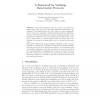Free Online Productivity Tools
i2Speak
i2Symbol
i2OCR
iTex2Img
iWeb2Print
iWeb2Shot
i2Type
iPdf2Split
iPdf2Merge
i2Bopomofo
i2Arabic
i2Style
i2Image
i2PDF
iLatex2Rtf
Sci2ools
203
click to vote
FORTE
2011
2011
A Framework for Verifying Data-Centric Protocols
Abstract. Data centric languages, such as recursive rule based languages, have been proposed to program distributed applications over networks. They simplify greatly the code, which is orders of magnitude shorter, much more declarative, while still admitting efficient distributed execution. We show that they also provide a promising approach to the verification of distributed protocols, thanks to their data centric orientation, which allows to explicitly handle global structures, such as the topology of the network, routing tables, trees, etc, as well as their properties. We consider a framework using an original formalization in the Coq proof assistant of a distributed computation model based on message passing with either synchronous or asynchronous behavior. The declarative rules of the Netlog language for specifying distributed protocols, as well as the virtual machines for evaluating these rules, are encoded in Coq as well. We consider as a case study tree protocols, and show how...
Related Content
| Added | 28 Aug 2011 |
| Updated | 28 Aug 2011 |
| Type | Journal |
| Year | 2011 |
| Where | FORTE |
| Authors | Yuxin Deng, Stéphane Grumbach, Jean-François Monin |
Comments (0)

